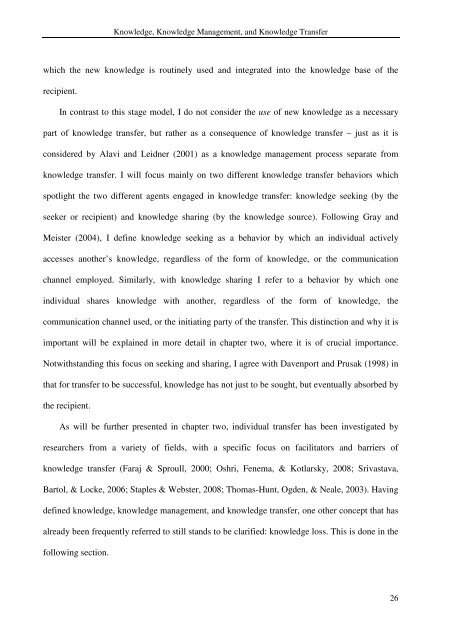thesis_Daniela Noethen_print final - Jacobs University
thesis_Daniela Noethen_print final - Jacobs University
thesis_Daniela Noethen_print final - Jacobs University
Create successful ePaper yourself
Turn your PDF publications into a flip-book with our unique Google optimized e-Paper software.
Knowledge, Knowledge Management, and Knowledge Transfer<br />
which the new knowledge is routinely used and integrated into the knowledge base of the<br />
recipient.<br />
In contrast to this stage model, I do not consider the use of new knowledge as a necessary<br />
part of knowledge transfer, but rather as a consequence of knowledge transfer – just as it is<br />
considered by Alavi and Leidner (2001) as a knowledge management process separate from<br />
knowledge transfer. I will focus mainly on two different knowledge transfer behaviors which<br />
spotlight the two different agents engaged in knowledge transfer: knowledge seeking (by the<br />
seeker or recipient) and knowledge sharing (by the knowledge source). Following Gray and<br />
Meister (2004), I define knowledge seeking as a behavior by which an individual actively<br />
accesses another’s knowledge, regardless of the form of knowledge, or the communication<br />
channel employed. Similarly, with knowledge sharing I refer to a behavior by which one<br />
individual shares knowledge with another, regardless of the form of knowledge, the<br />
communication channel used, or the initiating party of the transfer. This distinction and why it is<br />
important will be explained in more detail in chapter two, where it is of crucial importance.<br />
Notwithstanding this focus on seeking and sharing, I agree with Davenport and Prusak (1998) in<br />
that for transfer to be successful, knowledge has not just to be sought, but eventually absorbed by<br />
the recipient.<br />
As will be further presented in chapter two, individual transfer has been investigated by<br />
researchers from a variety of fields, with a specific focus on facilitators and barriers of<br />
knowledge transfer (Faraj & Sproull, 2000; Oshri, Fenema, & Kotlarsky, 2008; Srivastava,<br />
Bartol, & Locke, 2006; Staples & Webster, 2008; Thomas-Hunt, Ogden, & Neale, 2003). Having<br />
defined knowledge, knowledge management, and knowledge transfer, one other concept that has<br />
already been frequently referred to still stands to be clarified: knowledge loss. This is done in the<br />
following section.<br />
26

















